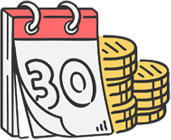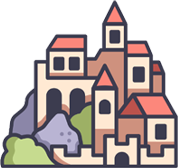Denmark
A QUICK GEOGRAPHIC
1. Location:
orthern Europe, bordered by Germany, North Sea, and Baltic Sea.
2. Mainland & Islands:
utland Peninsula (mainland) and over 400 islands.
3. Total Area:
2,933 km² (16,577 sq mi)
4. Capital City:
openhagen (located on Zealand island)
5. Coastline:
Approximately 7,314 km (4,545 mi) of coastline
6. Highest Point:
øllehøj (171 meters/561 feet)
7. Climate:
emperate maritime Mild winters, cool summers influenced by the North Atlantic Current.
8. Major Bodies of Water:
North Sea, Baltic Sea, Kattegat, and Skagerrak
9. Greenland & Faroe Islands:
utonomous territories
10. Lakes & Rivers:
argest lake. Lake Arresø Longest river: Gudenå (176 km/109 mi)
11. Natural Resources:
il, natural gas, wind power
12. Population Distribution:
oncentrated in urban areas (especially Copenhagen and Aarhus)
13. Flora & Fauna:
Diverse wildlife and forests
14. Environmental Initiatives:
Leader in green energy and sustainability

LOCATION & NEIGHBORS
Geographical Coordinates:
56.2639° N, 9.5018° E
Neighboring Countries:
Germany (68 km/42 mi border) Sweden via Öresund Bridge (16 km/10 mi) Sweden Denmark Copenhagen

DENMARK'S KEY FACTS

Population:
Approximately 5.9 million people

Area:
42,933 km² (16,577 sq mi)

GDP:
Approximately $450 billion USD

GDP per Capita:
Approximately $76,000 USD

Average Gross Salary:
About 45,000 DKK/month (~$6,700 USD)

Life Expectancy:
Around 82 years Area: 42,933 km² (16,577 sq mi)

Copenhagen:
Capital and largest city

Aarhus:
Second-largest city GDP

Odense:
Third-largest city

Aalborg:
HNorthern Jutland city
THE ØRESUND BRIDGE
Connects Copenhagen, Denmark to Malmö, Sweden
Combined railway and motorway bridge
DEFINITION OF SCANDINAVIA
Countries: Denmark, Norway, Sweden
WHY DENMARK IS THE BEST
STUDY DESTINATION
FOR INTERNATIONAL STUDENTS
High-Quality Education
Top Academic Standards: Renowned for high academic standards and innovative teaching.
Research Excellence: Home to top-ranked universities with strong research programs.English-Taught Programs
Wide Range: Many programs in English, especially postgrad.
No Danish Required: Study in English without needing to learn Danish.
Affordable Tuition Fees
Scholarships: Available for international students.
Work Opportunities
Post-Study Visa: Gain work experience after graduation.
Quality of Life
Happiness: Denmark ranks high in global happiness and quality of life.
Safe and Welcoming Environment
Friendly Society: Inclusive and high English proficiency.
Innovative and Entrepreneurial Spirit
Startup Support: Denmark offers strong support for startup ecosystems.
Excellent Infrastructure
Public Transportation: Efficient and well-connected.
Sustainable Living
Environmental Programs: Study and engage in green initiatives.
Cultural Richness
Festivals & Cuisine: Experience Danish culture.
Research Opportunities
International Projects: Participate in global research.
Healthcare System of Denmark
Universal Coverage
Free access to medical services for all residents, including international students.
This updated and streamlined presentation captures all the essential reasons why Denmark is an excellent study destination, making it easy to follow and visually engaging.
Higher Education System in Denmark FOR Non-EU and International Students
Types of Institutions and Examples
1. Universities:
Focus: Research and theoretical knowledge.
Programs: Bachelor's, Master's, and PhD programs.
Examples: University of Copenhagen, Aarhus University, Technical University of Denmark (DTU), Copenhagen Business School (CBS), Aalborg University, University of Southern Denmark (SDU), Roskilde University (RUC), University of Copenhagen (ITU).
2. University Colleges:
Focus: Applied sciences and practical skills.
Programs: Professional Bachelor's degrees and some Master's programs.
Examples: VIA University College, University College Copenhagen (KP), University College of Northern Denmark (UCN), and UC South Denmark (UCSyd), University College of Northern Denmark (UCL), Danish School of Media and Journalism (DMJX).
3. Business Academies:
Focus: Practical and vocational training in business fields.
Programs: Academy Profession (AP) degrees and Professional Bachelor's degrees.
Examples: Copenhagen Business Academy, Aarhus Business Academy, IBA International Business Academy, Business Academy Aarhus, Zealand Business College (ZBC), Business Academy Lillebaelt.
4. Specialized Institutions:
Focus: Art, music, architecture, and performing arts.
Programs: Bachelor's, Master's, and sometimes PhD programs.
Examples: The Royal Danish Academy of Fine Arts, The Royal Danish Academy of Music, Rhythmic Music Conservatory, The Royal School of Library and Information Science, Danish School of Media and Journalism (DMJX), Aarhus School of Architecture, VIA University College.
STEP-BY-STEP PROCESS FOR STUDENT VISA AND FAMILY REUNIFICATION VISA (UPDATED 18.07.2024)
1. Research and Choose Programs
Identify suitable programs.
Estimate tuition and living expenses.
2. Prepare and Take English Proficiency Test
Register for IELTS/TOEFL.
Prepare and take the test.
3. Apply to Universities (3-4 Months)
Gather required documents.
Submit applications (3 universities: 300-450 EUR, 1 university 50-150 EUR).
4. Receive Offer Letters and Accept Admission
Wait for responses.
Accept the best offer.
5. Arrange Finances and Pay Tuition Fee (1 Month)
Ensure sufficient funds.
Pay first semester's tuition fee (5,000 EUR*).
6. Apply for Student Visa and Family Reunification Visa (3-4 Months)
Prepare and submit visa documents.
Pay visa fees (255 EUR/APPLICANT).
7. Book Flights and Prepare for Departure (1 Month)
Secure round-trip flights (500 EUR for tickets).
Arrange accommodation and pack essentials.
BUDGET
- 1. Application Fees: 300-450 EUR
- 2. Tuition Fees: 10,000 EUR/YEAR
- 3. Visa Fees: 255 EUR
- 4. Flight Tickets: 500 EUR (for 3 tickets)
ADDITIONAL CONSIDERATIONS:
- Living Expenses Proof
- Student Visa: NO FUND SHOW
- Family Reunification Visa [SPOUSE+KID]: 26,400 EUR
CONVERSION TO EUROS (EUR) JUNE 2024
1. During Academic Year:
- Allowed Work Hours: Up to 20 hours per week.
- Average Hourly Wage: Minimum 12.50 EUR (Bare minimum; you will always earn more).
- Monthly Earnings: (20 hours/week)
- EUR: 1,500 EUR
2. During Holidays (Full-Time Work Allowed):
- Full-Time Work Periods: June, July, August, December 15th to January 15th.
- Average Hourly Wage: Minimum 12.50 EUR (Bare minimum; you will always earn more).
- Monthly Earnings: (full-time, 37 hours/week)
- EUR: 2,550 EUR
FULL-TIME WORK PERIODS FOR INTERNATIONAL STUDENTS IN DENMARK
International students on a student visa in Denmark are allowed to work full-time during the following periods without restrictions:
- Winter Holidays:
- December 15th to January 15th: One-month period during the winter break
Work Opportunities for Spouses of
International Students in Denmark
1. Work Limits:
No Restrictions: Spouses can work full-time.
2. Expected Earnings:
Average Hourly Wage: Minimum 12.50 EUR (Bare minimum; you will always earn more).
Monthly Earnings (37 hours/week): 2,850 EUR
Work Opportunities for Children of
International Students in Denmark
Children Under 18 Years Old:
Work Limits:
- Ages 13-15: Limited hours outside school time.
- School Days: Up to 2 hours
- Non-School Days: Up to 7 hours (max 12 hours/week)
- School Holidays: Up to 7 hours/day, 35 hours/week
Types of Jobs:
- Light work such as delivering newspapers, working in shops, or assisting in offices.
- Not allowed in hazardous or physically demanding jobs.
Expected Earnings:
- Average Hourly Wage: Minimum 12.50 EUR (Bare minimum; you will always earn more).
- Monthly Earnings (school term, 12 hours/week): 150 EUR
- Monthly Earnings (school holidays, 35 hours/week): 437.50 EUR
WORK OPPORTUNITIES FOR CHILDREN 18
AND OLDER IN DENMARK
1.Work Limits:
No Restrictions: Children 18 and older can work full-time.
2. Types of Jobs:
Broad range including part-time, full-time, internships, and temporary jobs. Common sectors: Retail, hospitality, administrative roles, internships in their field of study
3. Expected Earnings:
Average Hourly Wage. Minimum 12.50 EUR (Bare minimum, you will always earn more). Monthly Earnings for Full-Time Work (37 hours/week): EUR 2,850 EUR
4. Employment Rights:
Same as adult workers in Denmark Protected by Danish labor laws including minimum wage, working conditions, and employee benefits.
5. Finding Jobs:
University Career Services Job Portals (Jobindex, Workindenmark, Linkedin) Networking
6. Benefits of Working:
Financial independence Gaining valuable work experience Building a professional network in Denmark
